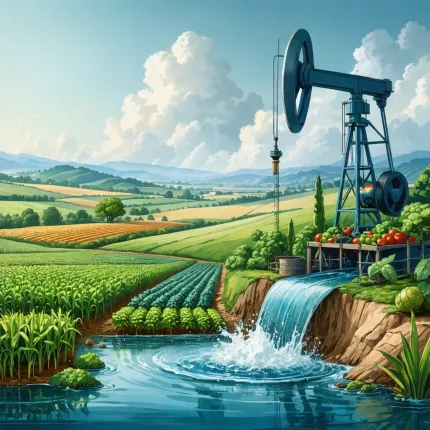When Water Becomes the Bottleneck: Why Efficient Pumping Matters More Than Ever
Imagine standing in the middle of a sprawling farm or a busy factory floor, watching the intricate dance of machines and manpower. Everything seems to flow smoothly—except for one crucial element: water. Without reliable water movement, crops wither under the relentless sun, and industrial processes come to a grinding halt. This is where bomba d’água, or water pump technology, steps in as a silent hero, transforming not just how water moves, but how entire industries perform.
Water has always been the lifeblood of agriculture and industry, yet the challenge lies in delivering it precisely where and when it’s needed. Traditional methods—manual hauling, gravity-fed irrigation, or rudimentary wells—simply can’t keep pace with modern demands. As populations grow and production scales, the inefficiencies in water delivery become glaring, threatening yields and profitability. It’s a scenario that’s increasingly common in farming communities and manufacturing hubs alike: too much water wasted, too little reaching its target, and precious time lost in the process.
This scenario isn’t just inconvenient; it strikes at the heart of sustainability and economic viability. The question then becomes: how do we overcome these hurdles? How can industries and farms ensure that water, this vital resource, is harnessed efficiently, without draining budgets or natural reserves?
The Pulse of Progress: How Bomba d’Água Systems Revolutionize Water Management
Enter the bomba d’água—more than just a mechanical device, it’s the cornerstone of modern water management. These water pumps have evolved beyond basic function, now embodying cutting-edge water pump technology that adapts to diverse environmental and operational conditions.
At its core, the bomba d’água is designed to move water with precision and power, whether lifting groundwater to thirsty crops or circulating fluids through industrial machinery. But what truly sets today’s pumps apart is their integration with smart controls, energy-efficient motors, and durable materials engineered to withstand harsh environments.
Consider the agricultural sector: farmers who once relied on inconsistent rainfall or labor-intensive irrigation systems can now deploy bomba d’água units that deliver steady, controllable water flow tailored to specific crops. This means healthier plants, higher yields, and better resource conservation. Similarly, on the industrial front, water pumps serve as vital industrial tools, ensuring cooling systems, chemical processes, and production lines run without interruption.
Beyond mere functionality, the adoption of advanced bomba d’água systems signals a shift towards sustainability and operational excellence. They offer:
- Energy efficiency: Cutting-edge pump designs reduce electricity consumption, lowering costs and environmental impact.
- Reliability: Robust construction minimizes downtime, keeping agricultural and industrial activities on track.
- Scalability: Modular and customizable solutions meet the unique demands of small farms to large manufacturing plants.
- Automation compatibility: Integration with sensors and IoT devices allows real-time monitoring and adaptive control.
These features collectively turn the bomba d’água from a simple water mover into an indispensable asset that drives both productivity and innovation.
Charting a Course Forward: What This Means for Agriculture and Industry
For those deeply invested in agriculture and industrial production, understanding the role of bomba d’água technology isn’t just academic—it’s a practical imperative. Efficient water pumping directly correlates with higher crop quality, reduced operational costs, and improved environmental stewardship.
In this article, we will explore:
- The evolution of water pump technology and its impact on modern agriculture.
- How bomba d’água systems serve as critical industrial tools that enhance manufacturing efficiency.
- Real-world examples illustrating the transformative power of advanced pumping solutions.
- Tips for selecting and maintaining pumps that align with specific operational needs.
Whether you’re a farmer struggling to irrigate vast fields, an engineer aiming to optimize factory workflows, or simply curious about how technology shapes resource management, this deep dive into bomba d’água systems will offer valuable insights. Water pumps are more than machinery—they are catalysts for growth, efficiency, and sustainability in our ever-demanding world.
So, let’s journey together into the fascinating world of water pump technology and discover how bomba d’água is making waves across agriculture and industry.

Understanding the Role of Bomba d’Água in Agriculture and Industry
What is a Bomba d'Água and How Does It Work?
The term bomba d'água literally translates to "water pump" in Portuguese, referring to mechanical devices designed to move water from one place to another. Water pump technology has evolved significantly over the years, incorporating various designs such as centrifugal pumps, submersible pumps, and positive displacement pumps, each optimized for different applications.
Fundamentally, a bomba d'água operates by converting mechanical energy into hydraulic energy, creating a flow of water that can be directed to irrigation fields, industrial processes, or municipal supplies. The efficiency of a water pump depends on factors like pump design, power source, and the nature of the fluid being pumped.
Why is Bomba d'Água Essential for Agricultural Efficiency?
Agriculture relies heavily on effective water management. The implementation of advanced bomba d'água systems has revolutionized irrigation practices, enabling farmers to optimize water usage, reduce waste, and increase crop yields.
Key ways water pumps enhance agriculture include:
- Precision Irrigation: Using bomba d'água with modern irrigation systems allows for targeted watering, ensuring crops receive the right amount of water at the right time.
- Drought Mitigation: Efficient water pumps can draw from deep wells or reservoirs, providing a reliable water source even during dry spells.
- Labor and Time Savings: Automated pumping systems reduce manual labor and speed up irrigation cycles, allowing farmers to manage larger areas effectively.
- Energy Efficiency: Newer water pump technology often incorporates energy-saving features such as variable frequency drives (VFDs), reducing operational costs.
According to recent agricultural studies, farms using advanced bomba d'água systems have reported yield increases of up to 30%, primarily due to improved water distribution and reduced soil erosion.
How Do Bomba d'Água Systems Boost Industrial Efficiency?
In industrial settings, water pumps are indispensable industrial tools used for cooling, processing, and wastewater management. The versatility of bomba d'água technology allows it to adapt to various industrial requirements, from chemical manufacturing to food processing.
Industrial benefits of effective water pump technology include:
- Process Stability: Consistent water flow ensures stable temperatures and conditions in manufacturing processes.
- Wastewater Handling: Pumps are critical in transporting and treating industrial effluents, supporting environmental compliance.
- Energy Management: Advanced pumps minimize energy consumption, which is crucial in industries with high operational costs.
- Maintenance Reduction: Modern bomba d'água systems often feature self-cleaning and corrosion-resistant materials, extending lifespan and reducing downtime.
For example, a large textile manufacturing plant integrated state-of-the-art water pump technology and witnessed a 20% reduction in water consumption and a 15% decrease in energy costs within the first year.
What Are the Latest Innovations in Water Pump Technology?
Water pump technology is continuously advancing, focusing on sustainability, efficiency, and smart integration. Some of the latest trends include:
- IoT-Enabled Pumps: These systems provide real-time monitoring and predictive maintenance, minimizing failures and optimizing performance.
- Solar-Powered Pumps: Solar bomba d'água solutions are gaining traction, especially in remote agricultural areas, reducing reliance on fossil fuels.
- Variable Frequency Drives (VFDs): VFDs allow pumps to adjust speed based on demand, significantly lowering power consumption.
- Eco-Friendly Materials: Development of pumps using recyclable and corrosion-resistant materials enhances durability and environmental impact.
How to Choose the Right Bomba d'Água for Your Needs?
Selecting the appropriate water pump depends on various factors, including:
- Application Type: Agricultural irrigation, industrial processing, or municipal water supply.
- Water Source and Quality: Surface water, groundwater, or wastewater, each requiring specific pump types and materials.
- Flow Rate and Pressure Requirements: Determining the volume and pressure needed ensures optimal pump sizing.
- Energy Source: Availability of electricity, solar power, or fuel-based engines influences pump selection.
- Maintenance and Durability: Consider pumps with features that minimize downtime and extend operational life.
Consulting with industrial tools specialists or agricultural engineers can help identify the best bomba d'água system tailored to your specific operational demands.
Conclusion: The Strategic Importance of Bomba d'Água Systems
The integration of bomba d'água systems is a cornerstone for boosting both agricultural productivity and industrial efficiency. With ongoing advancements in water pump technology, these industrial tools not only enhance operational capabilities but also contribute to sustainable resource management.
Whether it is maximizing crop yield through precise irrigation or ensuring continuous industrial processes with reliable water flow, the role of bomba d'água is indispensable in modern economies. Keeping abreast of technological innovations and selecting the right pump systems can lead to significant cost savings, environmental benefits, and improved productivity.





